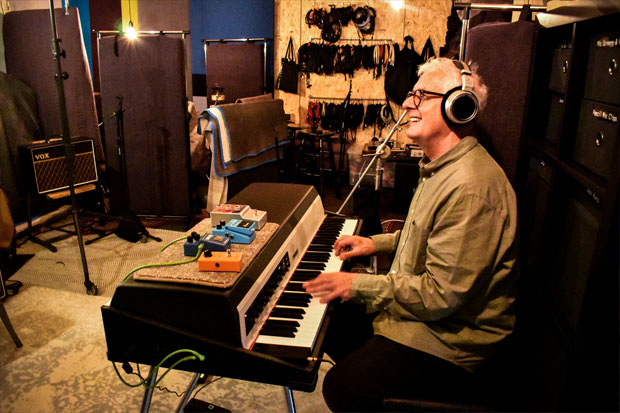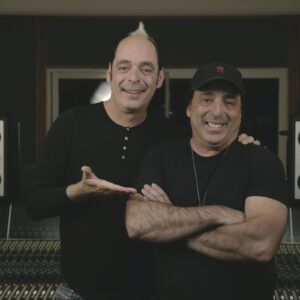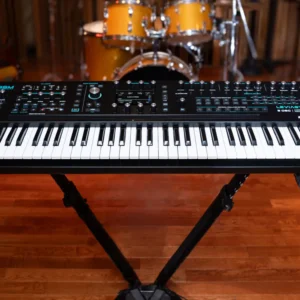
We only recommend products that we use and believe in. When you purchase through links on our site, we may earn an affiliate commission.
Baltic Jazz Recordings features sound of the Rhodes MK8 as a ‘primary building block’
Legendary engineer and record producer Steve Levine is known primarily for his groundbreaking work in the ’80s. As a ‘producer’s producer’ that cut his teeth as a Tape Op for CBS Studios in the mid ’70s, with bands like The Clash, XTC, The Jags, The Vibrators and many others, his breakthrough moment as a producer came with “Do You Really Want To Hurt Me,” Culture Club’s hit that rocketed to the top of the charts in 1982. Levine has always remained abreast of technology changes in the industry, particularly as it relates to studio recording and musical instrument tools.
Levine’s latest project, Baltic Jazz Recordings, saw the producer reacquainting himself with the familiar sound of a legendary brand. Having acquired a new Rhodes MK8 — an entirely new instrument that is sonically faithful to the original Rhodes electro-mechanical piano but with modern improvements — Levine set out to create a classic sounding jazz recording, using the new Rhodes MK8 as a foundational building block.
No stranger to the classic Rhodes sound, Levine was excited to add the MK8 to his arsenal of creative tools: “A Lot of the stuff I recorded in the ’70s was with a Fender Rhodes, and I was always a Rhodes man,” he says. “I rarely used the competitors’ keyboards, because they were always more trouble than it was worth and tended to sound quite poor. For me, growing up with Stevie Wonder and the Isley Brothers, this was the sound that I loved and adored. I had never ever owned one, and even during the original Culture Club sessions we used to rent one.”
When Levine heard about Rhodes being acquired and a new electro-mechanical keyboard being re-imagined and manufactured in nearby Leeds, UK, his interest was piqued: “I thought that this would be a perfect investment for the studio,” he says. Soon thereafter, he contacted the manufacturer and made the purchase. “It’s one of the first ones, and I absolutely love it to bits.” Since taking delivery, the MK8 has become a staple in Levine’s studio, and he appreciates many of its updated design features: “For me, the audio quality has been absolutely top notch, and I love the fact that it has both ¼” Jack and Balanced XLR outputs as well as the Jack “Send & Return” found on the original Rhodes.”
With a current focus on collaborating with emerging young talent, Levine’s Baltic Jazz Recordings — which began just over one year ago and has since spawned three hits on the Jazz FM playlist — features rising vocalists and instrumentalists. “There are a lot of great jazz players in the northwest of England, so the project was a way to introduce many of these great musicians through Baltic Jazz Recordings.” He says that in addition to an upright bass and an electric guitar running through a Fender Deluxe Reverb, the MK8 has been the foundational building block of the new project, and its sound is present on every track: “The Rhodes MK8 is all over it, the sound is quite rich and lovely,” he states.
To record the new MK8, Levine used (2) Sennheiser e906 microphones on a Roland JC-40 amplifier going into a Neve 1073 mic pre. He also took the XLR outputs of the MK8 and ran a stereo signal into his console. Levine says that the natural bleed from the Roland Jazz Chorus was a key element in the recorded sound: “This gave us a really interesting swirling chorus sound in the room, and it was picked up by the other live mics – including the Neumann fet U47 that we had on the upright bass,” he says.
While the new album heavily features the MK8, Levine says that he also used the Rhodes V8 plug-in extensively as well. “If I’m doing my own piano parts, sometimes I will use the Rhodes V8 plug-in because I’m not such a great keyboard player.” On a few tracks, he says he played a simple piano part using the V8 plug-in, and his keyboardist Jack Hymas played a more intricate piano part alongside it using the MK8. “We said to each other ‘that’s actually pretty good.’ The combination of both the MK8 piano and V8 plug-in worked really well. It’s a great plug-in, and probably the best plug-in out there that emulates the sound of a Rhodes,” Levine says.
Levine says that while the Baltic Jazz Recordings album is now wrapped up and all set for a release in August, he continues to use both the MK8 and V8 on a myriad of other current projects. ” I am very proud to have it in my studio,” he says. “During the jazz sessions Culture Club came to my studio in Liverpool because they had a few days off. Roy [Hay, member of Culture Club] saw the MK8 and said, ‘Oh my god you’ve got a Rhodes’. It sort of was a complete circle.”
To learn more about Steve Levine and his Baltic Jazz Recordings project, please visit https://balticjazzrecordings.co.uk/.
About Rhodes
For Rhodes loyalists around the world, this is a new chapter in Rhodes history; not a new book. With the Rhodes MK8, we’re returning to the principles, aesthetic, craftsmanship and pride of Harold Rhodes’ originals. We’re paying homage to the past with our gaze fixed firmly on what lies ahead.



